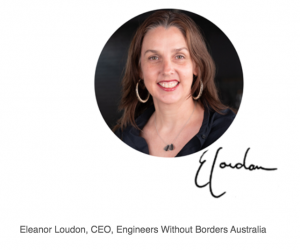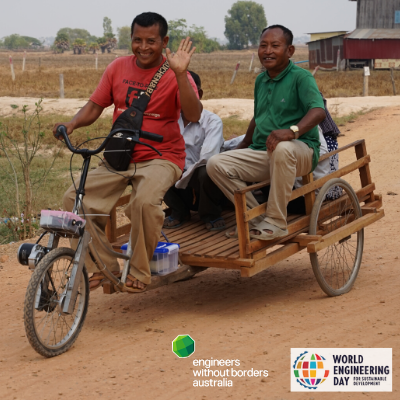A wonderful legacy of the World Engineers Convention held in Melbourne late last year was the birth of the annual World Engineering Day for Sustainable Development, that we celebrate today, Wednesday March 4th, 2020 – a critical bringing-together of the engineering community globally, to create a world where technology benefits all.
Our commitment to this has been even more sharpened with the finalisation of the EWB Australia 2030 Strategy, only recently unanimously adopted by our Board, and now set for public launch in July 2020. The strategy builds on what we know we do well, and brings increased focus to our purpose, committing to a sustainable world where no one is left behind. It’s ambitious, it‘s exciting, and I can’t wait to share it with you!
As we work to deliver on our new 2030 goals over the next decade, we know that there is increasing inequality, and that the most vulnerable are the ones most at risk from complex challenges like climate change and increased people movement. We also know that the way we adapt to our environment to suit ourselves can be either problematic, or have vast potential for positive outcomes. EWB’s commitment over the next ten years is to ensure (and prove) that technology development with people and the planet in mind is front and centre, and that it can not only improve lives, but ensure that we are securing a healthier planet for future generations – for not only its people, but every other living thing; it’s trees, waterways and creatures.
At EWB we use the SDGs both as a design tool and as a means to track our progress and impact. The SDGs prompt us to ask critical questions – as a lens through which to push our thinking. A current example of this is a project underway in Cambodia, where our newly-created Technology Development department is designing a wheelchair accessible moto with communities that aims to give mobility-impaired people a personal device to increase their ability to transport themselves.
These are based on the diesel-fuelled motos commonly seen in Cambodia, but when we added a climate lens (SDG 13) over this, it got our team and the community we work alongside exploring bigger, bolder solutions.… an electric moto creates a more sustainable power source, which could engage a local business to create recharge stations, which has led to consideration of a research project looking at renewable, sustainable, electric transport infrastructure, accessible and affordable, for all community in rural Cambodia.
Through one simple question we have unlocked a whole realm of sustainable possibilities which will lead to trackable outcomes against many of the SDGs beyond Climate change including SDG 7: Affordable clean energy; SDG 8: Decent Work and Economic Growth; and SDG 10: Reducing inequalities.
And of course we couldn’t do any of our work without others, in this case our partner in Cambodia, the community and the local businesses who are helping with prototyping, and the 44 project volunteers primarily based in Australia, who are providing remote support for R&D – SDG 17: Partnerships for the goals.
That is the power of the SDGs.
This World Engineering for Sustainable Development Day, we urge you to ask more questions to unlock greater global potential, to benefit all.



